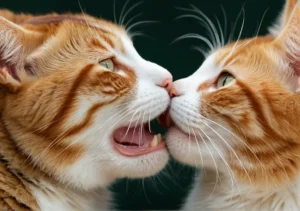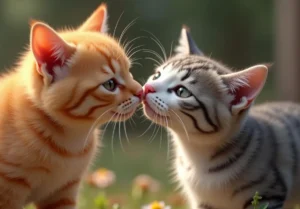Cats can be mysterious creatures, exhibiting behaviors that often leave us perplexed. One such behavior is when cats seem to bite at the air when you scratch their back. Have you ever wondered why they do this?
In short, cats may bite the air when you scratch their back as a way to express pleasure and excitement. This behavior is known as the “euphoria bite” and is a sign that your feline friend is thoroughly enjoying the attention. Let’s delve into why cats exhibit this quirky behavior and what it could mean for their overall well-being.
The Euphoria Bite: Understanding Your Cat’s Behavior
Have you ever noticed your cat seemingly nibbling on the air when you scratch their back? This behavior, known as the “euphoria bite,” is actually a sign of pleasure and contentment in cats. When your feline friend engages in this behavior, it’s a way for them to express their enjoyment of the sensation by providing a gentle nibble. It’s similar to how some cats may purr or knead when they are feeling relaxed and happy.
So, next time you see your cat biting the air while you’re scratching their back, remember that it’s a sign of pure bliss for them.
Instinctual Behavior: Unraveling the Mystery
But why do cats specifically bite the air when their back is scratched? This behavior can be traced back to their instinctual nature. In the wild, cats often use their mouths to groom themselves and their offspring, so the act of biting while being petted may be a natural response for some cats. Additionally, cats have sensitive skin on their backs, and the sensation of being scratched can trigger this instinctual behavior.
To help your cat feel more comfortable and prevent unintended bites, try to watch for cues such as dilated pupils or a twitching tail, which may indicate that they are becoming overstimulated. Remember, understanding your cat’s natural instincts can help you create a harmonious environment for both you and your feline companion.
For more information on understanding your cat’s instincts, you can check out this helpful resource from the American Society for the Prevention of Cruelty to Animals (ASPCA): ASPCA Cat Behavior
Body Language: Decoding Your Cat’s Signals
Have you ever noticed your cat biting at the air while you scratch their back? It might seem odd, but this behavior actually has a lot to do with your feline friend’s body language. When a cat engages in air-biting during back scratching, it could be a sign of overstimulation.
Cats have sensitive skin, so while they may enjoy a good scratch, too much can be overwhelming for them. Air-biting can be a way for your cat to release pent-up energy and signal that they’re reaching their limit. Pay attention to other cues like tail flicking, ears flattening, or dilated pupils, which can indicate that your cat needs a break.
Understanding your cat’s body language is key to building a strong bond with your furry companion. By recognizing when they’ve had enough, you can ensure that every scratching session is a positive experience for both of you.
Health Considerations: When to Be Concerned
While occasional air-biting during back scratching is usually harmless, excessive or aggressive behavior could be a cause for concern. If your cat frequently bites at the air, it could be a sign of underlying health issues such as skin irritation, pain, or anxiety.
It’s essential to observe your cat’s overall behavior and look for any other signs of distress. If the air-biting is accompanied by aggression, excessive grooming, or changes in appetite, it’s best to consult your veterinarian for a thorough check-up. They can help determine if there are any health issues contributing to this behavior and recommend appropriate treatment.
Remember, your cat’s well-being is a top priority, so don’t hesitate to seek professional advice if you have any concerns about their behavior. Your furry friend relies on you to keep them happy and healthy!
Providing Enrichment: Keeping Your Cat Happy
Curious about why your cat seems to be nibbling at the air when you scratch their back? This behavior could be a sign that your feline friend needs more mental stimulation and enrichment in their environment. Cats are intelligent creatures that require mental and physical stimulation to stay happy and healthy. To reduce air-biting and promote overall well-being, consider providing interactive toys, puzzle feeders, scratching posts, and vertical spaces for climbing. Engaging your cat in playtime and incorporating new activities will keep them mentally sharp and satisfied.
Interactions with Other Cats: Social Dynamics at Play
When it comes to understanding why cats may bite at the air during back scratches, their social dynamics with other cats can also play a role. In multi-cat households, cats may exhibit behaviors such as air-biting to communicate or establish boundaries with their feline housemates. Observing how your cats interact with each other can provide insight into their behavior when receiving scratches. Additionally, offering separate scratching posts, feeding areas, and resting spots for each cat can help reduce any potential conflict and alleviate the need for air-biting behavior. Remember, a harmonious social environment is key to a happy cat household.
Alternatives to Air Biting: Bonding with Your Cat
If your cat tends to bite the air when you scratch their back, it may be a sign that they are seeking more engagement and stimulation. One alternative to this behavior is interactive play sessions. Try using toys like feather wands or laser pointers to keep your cat active and entertained. Additionally, you can create a special bonding routine by setting aside time each day for grooming your cat or even teaching them new tricks. These activities can help fulfill your cat’s need for mental and physical stimulation, reducing the urge to air bite during back scratches.
Fun Facts About Feline Behavior
Did you know that cats have a specialized part of their brain dedicated to processing scents? This explains why your feline friend may be so interested in sniffing new objects or investigating different scents around your home. Additionally, cats have a unique way of communicating using their whiskers. Whiskers can indicate a cat’s mood and even help them navigate in the dark. So, the next time your cat exhibits quirky behaviors like air biting, remember that these actions are all part of their fascinating feline nature.
- Cats have a remarkable ability to rotate their ears 180 degrees, allowing them to pinpoint the source of a sound accurately.
- Contrary to popular belief, cats are not truly nocturnal but are crepuscular, meaning they are most active during dawn and dusk.
- Cats have a strong sense of independence but also value social connections, forming close bonds with their human companions.
Remember, understanding your cat’s unique behaviors and preferences can strengthen your bond and create a more enriched relationship with your feline friend. For more insights on feline behavior, you can explore reputable sources such as the American Society for the Prevention of Cruelty to Animals (ASPCA) website.
Alex, a passionate animal lover, has experience in training and understanding animal behavior. As a proud pet parent to two dogs and three cats, he founded AnimalReport.net to share insights from animal experts and expand his knowledge of the animal kingdom.




